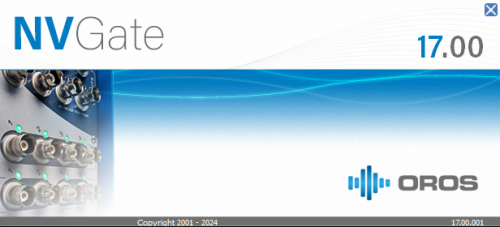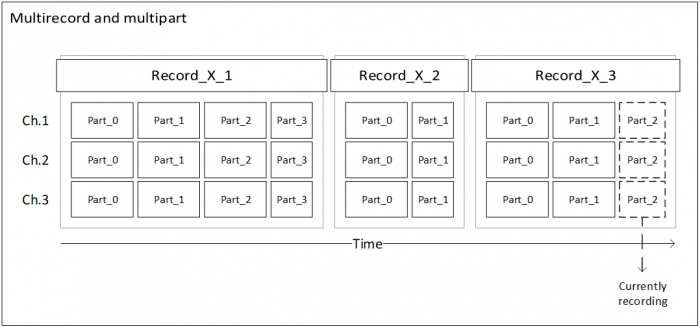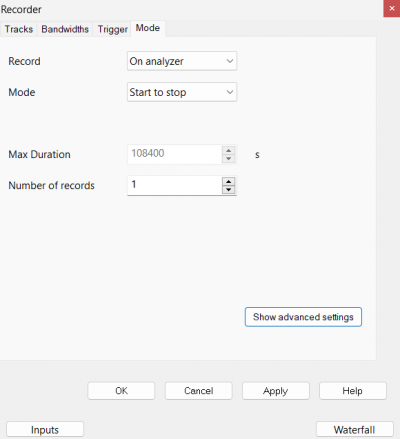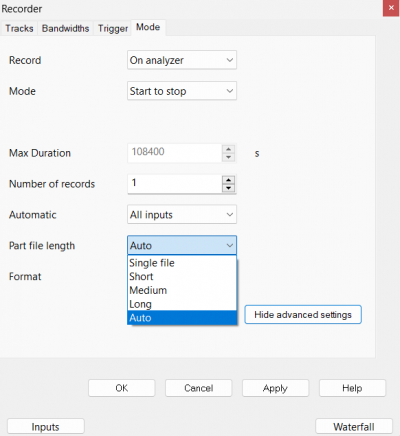Difference between revisions of "NVGate V17: Release note"
| Line 22: | Line 22: | ||
Time signals are now stored using a brand-new structure that optimizes both signal processing and data management. Users have the flexibility to configure each time signal to include multiple records, with each record further divided into parts of customizable lengths. | Time signals are now stored using a brand-new structure that optimizes both signal processing and data management. Users have the flexibility to configure each time signal to include multiple records, with each record further divided into parts of customizable lengths. | ||
[[File:multirecord_multipart.png|700px]] | [[File:multirecord_multipart.png|700px]] | ||
By default, the recorder is configured with a single record and the part length set to 'Auto' as below: | By default, the recorder is configured with a single record and the part length set to 'Auto' as below: | ||
[[File:recorder_conf_1.png|400px]] | [[File:recorder_conf_1.png|400px]] | ||
The duration of a part can be configured in the advanced settings as below: | The duration of a part can be configured in the advanced settings as below: | ||
[[File:recorder_conf_2.png|400px]] | [[File:recorder_conf_2.png|400px]] | ||
| Line 38: | Line 43: | ||
* Medium: Part length is 640 seconds | * Medium: Part length is 640 seconds | ||
* Long: Part length is 1920 seconds. | * Long: Part length is 1920 seconds. | ||
* Auto: | * Auto: The part length depends on the recording mode: | ||
** " | ** "Start to stop" mode: Part length is 640 seconds. | ||
** " | ** "Start to time" mode: | ||
** " | *** If duration is longer than 100 hours, then part length is 1920 seconds; | ||
*** If duration is between 10 and 100 hours, then part length is 640 seconds; | |||
*** If duration is between 5 and 10 hours, then part length is 128 seconds; | |||
*** If duration is less than 5 hours, then part length is 64 seconds. | |||
** "Time to stop" mode: | |||
Revision as of 14:19, 9 September 2024
OROS strives to be closer to its users, carefully listening to needs and requests. For that reason, OROS regularly releases new versions. Customers under contract automatically benefit from each release.
This new major version of NVGate unlocks the full potential of OROS Framework, empowering you with advanced customization options and complete control over your data – keeping you ahead with cutting-edge tools for efficient and tailored signal management at no additional cost.
This release note describes the content of the version, with operating details.
To download and install NVGate V17, check this page.
Compatibility: NVGate V17 is compatible with the following OROS instruments: O4 - OR10 - OR35 TW - OR36 TW - OR38 TW.
New Data Structure: Redefining Flexibility for Modern Signal Management
Time signals are now stored using a brand-new structure that optimizes both signal processing and data management. Users have the flexibility to configure each time signal to include multiple records, with each record further divided into parts of customizable lengths.
By default, the recorder is configured with a single record and the part length set to 'Auto' as below:
The duration of a part can be configured in the advanced settings as below:
- Single file: Only 1 part per signal
- Short: Part length is 64 seconds
- Medium: Part length is 640 seconds
- Long: Part length is 1920 seconds.
- Auto: The part length depends on the recording mode:
- "Start to stop" mode: Part length is 640 seconds.
- "Start to time" mode:
- If duration is longer than 100 hours, then part length is 1920 seconds;
- If duration is between 10 and 100 hours, then part length is 640 seconds;
- If duration is between 5 and 10 hours, then part length is 128 seconds;
- If duration is less than 5 hours, then part length is 64 seconds.
- "Time to stop" mode:
The main features brought to users by the new data structure:



